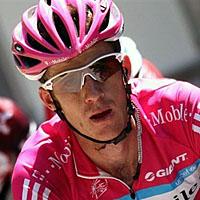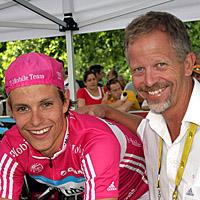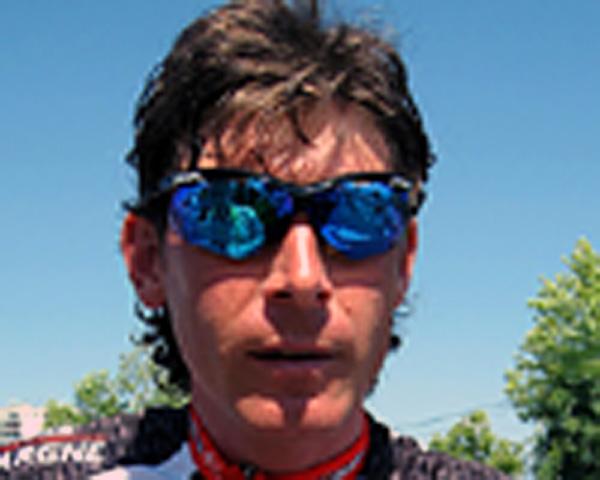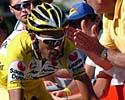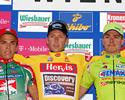Latest Cycling News for July 16, 2007Edited by Bjorn Haake
Rogers' crash - was it a mechanical?By Gerard Knapp
Country holds out for Evans and Gerrans as Aussies cop worst day ever in the Tour de France
Mick Rogers' crash on stage 8 of the 2007 Tour de France has fairly devastated the Australian cycling community, even if the rider himself has calmly indicated he'll be back in a few weeks. At the time of his heavy fall on the descent of the Cormet de Roselend, the T-Mobile GC man was the best-placed rider in a select group and had ridden himself into the maillot jaune virtuel, as the gap to the next significant group containing the then yellow jersey, T-Mobile's Linus Gerdemann, was almost six minutes. Rogers went into the stage trailing his team-mate by 4.03 and he'd gone clear with a strong group, including eventual stage winner Michael Rasmussen (Rabobank). Rogers had a 39 second GC buffer on the Danish climber and could have afforded to let the spindly Danish mountain goat take the stage, assuming the Australian was able to hold his wheel up the final ascent of the 5.4 percent, 18-kilometre category one Montée de Tignes. It was on the long, technical descent into Bourg-St-Maurice, where the Rogers group could see the penultimate ascent of the day looming ahead, the 15.3 kilometre climb of Montée de Hauteville, that Rogers and fellow breakaway David Arroyo (Caisse d'Epargne) crashed on a tight left hander with 54 kilometres to go; the Caisse d'Epargne man went over the barrier into a ditch and Rogers hit the deck. Both riders seemed to have little damage and quickly got back on their bikes in pursuit of the six front runners.
Cyclingnews will cover the 60th edition of
the Dauphiné Libéré live
as of stage 4 on Wednesday, June 10, at approximately 15:00 local Europe
time (CEST)/ 23:00 Australian time (CDT)/ 9:00 (USA East). Rogers actually caught the Rasmussen-led group after his accident but on the climb, he couldn't continue as the pain from his dislocated shoulder made its presence felt, and he abandoned with 35 kilometres left in the stage. The 'virtuel' position of Rogers in stage 8 had experienced observers of Australian cycling believing it may have been the first time an Australian cyclist had ridden himself into a yellow jersey position in a tough mountain stage of the Tour for over two decades. The last time was thought to be Phil Anderson's effort in the 1981 Tour. Anderson finished that day, much to the consternation of then Tour 'patron', Bernard Hinault, and took over the golden fleece. Rogers was perhaps unlucky, it seems, as speculation quickly emerged that an equipment problem contributed to his fall on the descent. This morning when he woke in France, Rogers wrote, "I have a dislocated right shoulder and will be out for a few weeks at least". Rogers' brother, bike shop proprietor Deane, was interviewed this morning on ABC Radio and said he believed there was an issue with the tyre and rim that had contributed to the fall; indeed, in the still images from the video highlights, the front wheel of Rogers' bike shows the tyre has started to peel away. However, Mick Rogers was more circumspect: "I don't really know what happened, I was going through the corner and then found myself on the ground. On the descent I came back to the leaders but once we started climbing again I just couldn't hang onto the handlebars anymore."
Aussies worst day in the Tour?It was a dramatic day in the Tour de France for the Australian contingent - perhaps the worst day on record - with three riders eliminated in one day of racing. Stuart O'Grady (CSC) crashed heavily and was taken to hospital, where he was diagnosed with nine broken ribs, a punctured lung and dislocated shoulder. Meanwhile, sprinter Robbie McEwen (Predictor-Lotto) found the mountains were no place for a sprinter to recover from his injuries sustained in stage 1. Although he finished the stage, his time was "Hors Delay", outside the time cut and therefore, he found himself out of the Tour. Earlier, Brett Lancaster (Milram), Athens Olympic gold medalist and leadout man for Milram super-sprinter Alessandro Petacchi, was also forced to abandon his first Tour - even though he worked for Petacchi's six victories in the 2007 Giro d'Italia - due to injuries sustained in a crash. In fact, Lancaster became ill during the Tour de Suisse in June and was on antibiotics leading into the Tour de France. So what were six are now two: Cadel Evans (Predictor-Lotto) and Simon Gerrans (Ag2R). The Australians' progress in the 2007 Tour has been felt with interest in Australia. The CEO of Cycling Australia, Graham Fredericks, told Cyclingnews, "I felt the pain when Michael Rogers dragged himself back onto his bike to try and finish the stage. It was heart wrenching to watch him climb in to the team car. "It might be some time before Stuart O'Grady is back to full fitness after his rotten luck. He'd already fought back from his crash in the prologue to put in such a great effort for his team but Stuey's tough and he'll overcome this setback. "Robbie stunned us all with his stage one win after most people had written him off. His guts and determination to keep riding despite his injuries was inspirational and I'm sure he'll be back in 2008 to fight for the green jersey. Brett Lancaster also demonstrated the Aussie spirit battling through as long as he could with illness and injury. "We sometimes forget when we witness the feats of courage of these supermen that they aren't made of steel - it just seems like it - and we hope to see them all back on their bikes again soon. "Now it's up to Cadel and Simon to fly the flag and we wish them the best of luck." Former ONCE and Festina professional, Stephen Hodge, who lives in Rogers' home town of Canberra, said, "I was certainly saddened by the terrible day we had in the Alps last night. We were justifiably ready to start looking for Mick to take on his announced role as one of the major figures in this year’s Tour de France, Stuart has been playing a key role so far in the Tour and would have been a major factor in any success enjoyed by the CSC team, and Robbie was in stunning form that we saw in Stage 1. "Poor old Stuey has ended up in a serious condition following what must have been a very hard fall into a post or pole, and I hope he makes a full recovery so he can pick his kids up to play, and mark some more races with his class. I think Michael will be very sore too for a while, but he will need to get back to his best form so he can notch up a few achievements before the next Tour and get his confidence for the big goals. Robbie will be back on top before we know it." But it wasn't all bad for the Aussies in stage 8. Hodge pointed to a great ride from Simon Gerrans. "He finished well up on the stage, and must be playing a very valuable role for his leader Christophe Moreau on Ag2r. Cadel is quietly going about his business in this Tour, and without wanting to pre-empt anything, if anyone can do something this year, it will be him." Pushing for reformBy Shane Stokes and Brecht Decaluwé
T-Mobile's Bob Stapleton has been one of the most outspoken managers in the business about the need to eliminate drug use in the peloton, and has been greatly motivated by Linus Gerdemann's stage win and spell in the yellow jersey. Cyclingnews' Shane Stokes spoke to the Californian at length before the start of the Tour, while Brecht Decaluwé caught up with him after Gerdemann's success. Whatever happens during the rest of the race, Linus Gerdemann's victory in Le Grand-Bornand was an important moment for cycling and the 2007 Tour de France. At the end of last season sweeping changes were made to the structure and lineup of the T-Mobile team, with a revised team roster, new look management, a considerably reinforced code of ethics and strict, innovative internal testing all being introduced. In that light, Linus Gerdemann's success on stage seven would appear to be a big plus for the sport. One of the first things the 24 year old German rider said after the finish was that this represented a new start for cycling. He'd just scooped the stage victory, the maillot jaune, the white jersey and the most aggressive rider award thanks to his efforts during the day and, as David Millar pointed out, this was the sign of a cleaner generation coming through. General manager Bob Stapleton has been behind many of the changes in the team. The 49 year old Californian is a highly successful businessman who began his relationship with the T-Mobile sponsor back in 2000 when it bought his communications company VoiceStream Wireless for $50 billion. For the full story click here.
Iván Gutiérrez goes day by dayBy Gregor Brown in Tignes
Iván Gutiérrez of Caisse d'Epargne has helped his team leaders through the Tour de France's first set of mountain stages. The 28 year-old Spaniard played his part in stage eight to Le Grande-Bornand and then returned in stage nine to make sure teammates Valverde and Pereiro were well taken care of the next day to Tignes. The relaxed Caisse d'Epargne rider explained that he is taking the Grand Tour day by day. "I feel calm. I think that Saturday I attacked too soon on the last climb and I made a mistake," the 2007 Tour Méditerranéen winner noted to Cyclingnews. Gutiérrez launched his artilleries on the Colombière pass but it was too soon and it allowed time for Gerdemann and De La Fuente to respond. "It will be tranquil. I will fight for the classification," Gutiérrez explained his Tour plans. "I am here to work for the team and for us it is important that the team doesn't work too much through Alps. We remain calm because we are good." The team had three leaders heading into the Tour de France with Alejandro Valverde, Vladimir Karpets and Oscar Pereiro but after Sunday's run it looks like the two Spaniards will lead the Caisse's push for the podium in Paris. Gutiérrez has his freedom but underlined the solid group dynamics. "I am able to go in the escape because it is better to be up front than in the gruppo. It is not only me but also my teammates that will try for the escapes. It is not easy because everyone in the world wants to go into the escape. Never say never, maybe the escape could arrive [successfully]. If there are important men in the escape and it goes well then it can arrive at the end of the stage. "Valverde and Karpets are going well, but also Pereiro. Everyone is convinced in their capabilities. We will work together over the coming stages and then in the Pyrénées. They are all very strong. "I am taking it day by day, the Tour is very long. Everyday the Tour can change. The stage that goes through Spain [stage 16 to Gourette-Col d'Aubisque] will be very, very dangerous. But really, I am thinking day by day. We are not alone and we have to watch how the others are going. So we have to not only consider ourselves but how we are going against the others." Is Alexander Vinokourov at 5'23" still a threat? "He is not dead and he has a lot of life in him." The heat that makes the Tour de France has arrived but Gutiérrez would rather it stayed cool as it was in the first few days. "I like the hot days but not the extremely hot days like now." A day of rest at altitude could cool him. "I think I may get to see my family when the Tour hits the Pyrénées but now I will enjoy the rest day [with the team]. I enjoy laughing and listening to music when we are racing during the Tour. I like to relax. I like rock and pop. "The Spaniards are very similar and in the team we have the same gusta," he said when questioned about his selection in music. "In the bus, we usually have music that everyone enjoys to create a good team environment."
The return of Iban Mayo
After his stellar win on Alpe d'Huez in 2003, things got a little quiet around Iban Mayo. Hailed as the next contender for a Tour de France victory, his engine frequently broke down in the mountainous stages of the Grande Boucle. But in this year's edition the Basque rider, who left Euskaltel for Saunier Duval at the end of last season, has not cracked yet in the mountains and in fact had a great performance in the first really difficult stage that featured 70 kilometres of uphill. Being in the group with all the contenders for the overall, Mayo was attentive and he and Alejandro Valverde were usually the ones to bring back Christophe Moreau, who showed his aggressiveness on the final climb, attacking so any times it was hard to keep track of. Mayo felt good and in the end was able to leave the group behind, gained half a minute over the chaser including Valverde, and was rewarded with 12 bonus seconds for the second place he achieved after winner Michael Rasmussen, who had taken off earlier in the day. Many consider Rasmussen not a threat for the overall due to his inferior time trialing skills. Saunier Duval's strong showing was rounded out by Juanjo Cobo, who came in 13th, a little over a minute after his leader. Iban Mayo was very clear about his ambitions after the race. "To tell you the truth, I was hoping to be in the lead, because yesterday I felt fine. But the Tour is a treacherous race, and you can never be 100 percent sure." The Spaniard confirmed that "in the early kilometres I could see that I was OK, so I knew I´d be fighting for a leading position." One thing he knew for sure was that when "Rasmussen broke clear and began to open a gap, I realised that winning the stage was going to be extremely difficult. Before the final climb, his advantage was so huge that victory was no longer a possibility to me." He described the beginning of the action with Moreau being the first to attack, but also felt that "Evans, Contador, Kashechkin, and Schleck didn't seem to be willing to cooperate." He acknowledged that there was a headwind and the best position was in the draft. But it didn't go unnoticed that "Moreau was riding too easily." Mayo revealed that "after having been through such a bad patch in the last editions of the Tour, being here, safe and sound, smells like victory to me," and that his major goal is a stage win, although "of course, the GC is tempting; stepping onto the final podium would be very nice." Knowing that the Tour is a difficult race, however, he'll take it day by day and says the most important is "keeping this feeling, the sensations I felt today." No rusting on the rest dayWhile riders will enjoy to sleep a little longer than usual (if not awoken by the UCI "vampires" for some early blood controls), the term rest day is a bit misleading. Most every team will have a press conference and the riders, especially the top contenders and stage winners like Michael Rasmussen, will be sitting through some Q&A with the press. Riders would likely rather rest completely than having to do the media stunt, but it is of course good for their and the sport's exposure. But besides those little distractions of the rest day, the riders will actually ride. Not too long, maybe an hour or two, and mostly relaxed. But it is vital to keep the blood flowing. Having raced intensely for one week, then stopping completely for a day and then starting again, the body will scream in pain, having expected that the suffering is over. Former polka-dot Stéphane Augé of Cofidis described what his day will look like in an interview with velo101.com and confirms that the day starts out a little quieter, with a "lazy morning, then a bit of training for an hour or two." He mentions that it is essential to recuperate, decompress and walk around a bit, "not just sit on the phone all day." Those who have no ambitions for tomorrow's hilly affair will likely take it a bit easier on the rest day than those who actually want to contend for victory. A typical route on a rest day may include a stop at the local coffee shop stop or a nice, cooling ice-cream to help fight the high temperatures of the last days and give the brain a little reward. Of course with using less energy throughout the day the racers will have to make sue they don't overeat and pay big time on their way up to Briançon.
Devolder scores big for Discovery Channel
While all the attention and focus is on the biggest cycling event of the year, in France, Belgian Stijn Devolder, who rides for the American Discovery Channel team, scored a big win in Austria by claiming their national Tour. The race ran from July 8 through to yesterday and features a mixture of sprint stages and mountain passes. This year the race went so high up the Austrian Alps, not only did the riders get dizzy, but they also rode through snow-capped scenery that reminded the racers that they were heading through one of the most popular skiing areas in the world. Devolder, the current Belgian Champion, started out by surviving the sprint stages, then finished a strong fourth in stage three to the Kitzbüheler Horn, a good minute behind teammates Thomas Rohregger and Christian Pfannberger. The two Austrians scored a 1-2 for the Elk Haus-Simplon team. In the Queen stage to Prägraten Devolder was again solid, finishing only 33 seconds back. In the overall he was still a good 90 seconds, though. The next day he was happy to see teammate Gianni Meersman take the win out of a seven-man break. Devolder finished some 9 minutes behind the lead group, but so did all the other contenders for the GC and there were no changes overall. On stage 6 Devolder wanted to get a decision for the overall and constantly attacked. The race leader felt the heat. "That was war today," Rohregger said. "Some of the other teams, led by Stijn Devolder, permanently attacked. We had to do a lot of work." Gerrit Glomser of the Volksbank team came out on top. But there were still no changes in the overall and time was running out. The time trial had to bring the decision and it was here where Stijn Devolder made the difference. Covering the 25 kilometres in only 28 minutes and twelve seconds, he averaged over 52 km/h and distanced Rohregger and Pfannberger by over two minutes to take the race lead with only one day remaining. Temperatures of 35 degrees made the task especially daunting. "The heat was enormous," Rohregger said. "I even warmed up in the air conditioned hotel." The final lap was a Champs-Elysees-like showdown in Vienna's inner city around the Ringstrasse.
Heras is ready to race againBy Antonio J. Salmerón "When I decided to try to return to racing, I was very aware that it was necessary to continue training in order to maintain a good physical state of form. And that is what I do. Not training five or six hours, like before, but I ride everyday. When I am in Béjar [where he was born - ed.] I usually train with some Under-23 amateurs and professional riders, such as Moisés Dueñas (Agritubel), who is now racing in the Tour," Roberto Heras explained to the Spanish sports newspaper Marca. The Spanish climber, who was sanctioned for two years in 2005, is planning on racing again, though he cautions that "I think that it is possible, but taking into account the current cycling [situation], there is only a fifty per cent chance. If it doesn't work out in the end, I will not feel frustrated. "For me, training does not impose any sacrifices. It is the advantage that I have. I enjoy doing what I like," he added. October 27 is the day the sanction expires, "that is [the day] when I received the communication of the 'positive', although my last competition was the Vuelta a España [in September]." In fact, Heras reveals that he has maintained some contact to cycling teams in order to race, but he is not going to do it for "30,000 euro, because I have dignity, like any sportsman and person." "After eleven years, I do not believe that I have anything to demonstrate to anybody. I want to return because I like that, as well as I believe that my cycling career has still not come to an end", expressed Heras.
Previous News Next News(All rights reserved/Copyright Knapp Communications Pty Limited 2007) |

|
January 2009 |
Recently on Cyclingnews.com |

